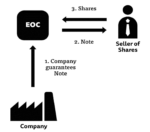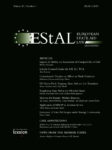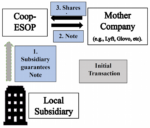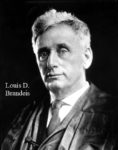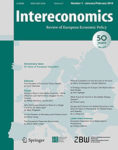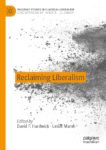Most cooperative organizations today do not exemplify any cooperative activity; non-worker cooperatives do not represent any cooperative activity of the members since the only joint activity of the organization is carried out by employees. The idea that cooperatives are democratically governed does not apply to non-worker cooperatives (based on the employment relation) since the members are not choosing the managers or governors of their own activity but of the activity of the people working in the cooperative.
European ESOP
The American Employee Stock Ownership Plan or ESOP is a leveraged buyout mechanism so that the employees in a company can, in effect, do a leveraged buyout of part or eventually all of their own company. ESOP is one of the most successful and unifying models for employee ownership in the world. The purpose of this paper is to analyze the main features of the US ESOP model and to define a technical description of the European ESOP, which builds on the good features of the US model and improves the flawed features.
Marcora Law for Europe
There is a time-tested solution in Spain and Italy that provides liquidity to such enterprises in a democratic manner by establishing employee ownership schemes. The new source of liquidity is allowing unemployed workers to capitalize part of their unemployment insurance to invest in a new or existing enterprise where they will have a job.
Using ESOPs to Democratize Labor-Based Platforms
Our purpose is to propose another complementary approach, which is democratizing and adapting the Employee Stock Ownership Plan to gain co-ownership in the local subsidiaries of the labor-based platforms (LBP). This option puts a new tool in the hands of the municipal and national authorities that could regulate the platform sector.
Less-Known Supporters of Workplace Democracy
his paper, published as an editorial in the Journal for Participation and Employee Ownership collects together extensive quotations and extracts from 19th and 20th century thinkers who were little-known for being supporters of workplace democracy.
The “Ownership of the Firm” is a Myth (1975)
This paper was originally published in a journal: Ellerman, David. 1975. “The ‘Ownership of the Firm’ Is a Myth.” Administration and Society 7 (1 May): 27–42, and then we immediately reprinted in a collection of essays: Ellerman, David. 1975. “The ‘Ownership of the Firm’ Is a Myth.” In Organizational Democracy : Participation and Self-Management, edited by David Garson and Michael P. Smith. Beverly Hills CA: Sage Publications.
Towards Abolishing the Renting of Persons
This paper is a write-up of a speech given in 2017 at a centennial ‘celebration’ of the 1917 Russian Revolution at the Haus der Kunst in Munich.
COVID-19 Aid to Promote Employee Ownership
The premise of this paper is that state aid to distressed companies should benefit not only the current owners but also the employees, who are the ones taking personal risks to continue or restart companies.
Reclaiming Democratic Classical Liberalism
The argument shows that the classical liberal endorsement of sovereign individuals acting in the marketplace generalizes to the joint action of individuals as the principals in their own organizations and associations.

